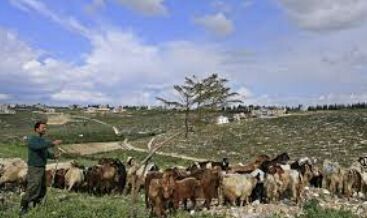Israeli Attacks Force Southern Lebanese Shepherds to Abandon Grazing Areas, Threatening Livelihoods
The rolling pastures of southern Lebanon have become off-limits for shepherds due to Israeli air raids, forcing them to confine their herds and burdening them with additional expenses. The ongoing conflict in the region is exacerbating the challenges faced by farmers and herders, highlighting the need for peaceful solutions to protect their livelihoods.
The rolling pastures of southern Lebanon have been the longstanding grazing grounds for local shepherds' flocks. However, these grazing areas have now become off-limits due to the dangers posed by Israeli air raids and artillery fire. Shepherds like Ali Beber, who has a flock of 350 sheep, are no longer able to take their herds to the border areas of Mays al-Jabal and Houla, where they used to graze. The relentless shelling has made it impossible for them to venture anywhere near these areas. As a result, the herds are now confined to a small, corrugated metal pen in the town of Majdal Selm, approximately seven kilometers west of their traditional grazing spot.
Ali Beber, 57, walks his sheep briefly every day, but he has had to spend around $2,000 to buy haystacks to feed his flock. This additional expense is a burden on him, as he had originally prepared hay for the sheep to consume during the winter. However, that hay was meant for rainy days, so he now finds himself having to go into debt to provide food for his animals. This dire situation is a consequence of the ongoing conflict between Israel and the Palestinian militant group Hamas in the Gaza Strip. Lebanese Hezbollah, an ally of Hamas, has been launching rockets at Israel, prompting retaliatory air strikes and artillery shells.
These attacks have not only destroyed agricultural land but have also resulted in fires burning olive trees, further devastating the herders and farmers in southern Lebanon. The economic downturn that Lebanon has been experiencing for the past four years has already put immense pressure on these communities, making this additional hardship even more challenging to overcome. The story of Jihad Said, who lost three cows to Israeli shelling, and the tragic deaths of two Lebanese shepherds who were shot at by Israeli troops earlier this month, exemplify the dangers faced by those living in these border areas.
Living under the constant threat of cross-border tensions, Lebanese herders are often subjected to lengthy inquiries by the Israeli military whenever they venture too close to the border. Ali Beber, in particular, reveals that he has been detained twice by Israel. The 2006 war between Israeli forces and Hezbollah had a devastating impact on farmers, and this current conflict is exacerbating those challenges. The story of Tony al-Amil, who was unable to harvest his wheat and barley due to the war in 2006, serves as a reminder of the long-lasting repercussions of such conflicts.
This time around, al-Amil initially stayed in the south during the first two weeks of shelling but eventually had to relocate his 100 sheep to the outskirts of Beirut as a makeshift solution. The plight of these shepherds and farmers highlights the heavy toll that conflicts take on the agricultural community. Their livelihoods are at risk, and they are grappling with both financial and emotional strain as they struggle to provide for their flocks. It is crucial to address the root causes of these conflicts and find peaceful solutions that would allow these communities to regain their normal lives and protect their valuable agricultural resources.




